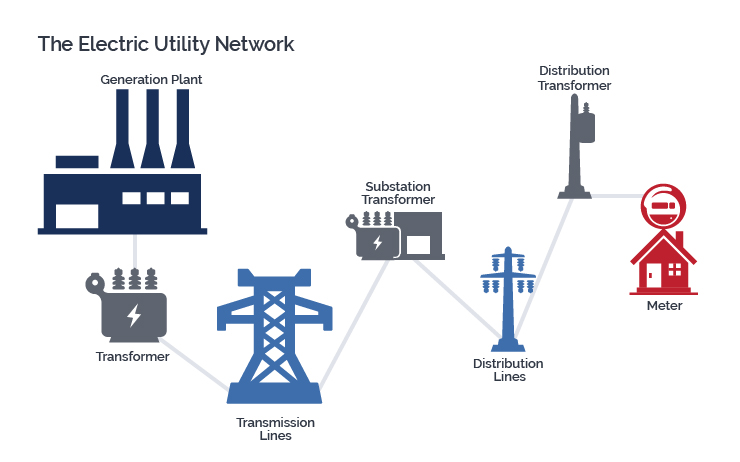Are you considering a careerpath in the electric utilities central industry? If so, you may be wondering, "Is electric utilities central a good career path?" The answer is a resounding yes! In today's technologically advanced world, it's nearly impossible to imagine our lives without electricity.
The electric utilities industry plays a pivotal role in generating, transmitting, and servicing electricity, making it an essential component of our daily lives. But what makes a career in electric utilities central a promising choice?
If you're curious about whether pursuing a career in electric utilities central is a wise decision, read on to discover the compelling reasons why it can be a rewarding and fulfilling path to follow.
What Is Electric Utilities?
Electric utilities are companies or organizations responsible for generating, transmitting, and distributing electricity to residential, commercial, and industrial customers. They play a crucial role in ensuring a reliable and consistent power supply to meet the energy needs of society.
These utilities operate power plants, electrical grids, and other infrastructure required to generate and deliver electricity.
The electric utilities industry is essential for powering homes, offices, schools, hospitals, factories, and various other establishments. It forms the backbone of modern civilization, as electricity is a fundamental requirement for numerous daily activities and the functioning of technological advancements.
Top Electric Utilities Companies
There are several notable electric utilities companies in the industry. Some of the prominent names include:
Duke Energy
Duke Energy is one of the largest electric power holding companies in the United States, serving approximately 7.9 million customers. It operates a diverse portfolio of power generation assets, including nuclear, coal, natural gas, and renewable energy sources.
Exelon Corporation
Exelon is a leading energy provider in the United States, operating a balanced mix of nuclear, fossil, and renewable power generation facilities. It serves approximately 10 million customers across several states.
NextEra Energy
NextEra Energy is one of the largest renewable energy companies globally and a major player in electric utilities. It operates through its subsidiaries, including Florida Power & Light Company (FPL) and NextEra Energy Resources. NextEra Energy has a significant focus on clean energy generation, particularly wind and solar.
Dominion Energy
Dominion Energy is a diversified energy company that operates in multiple states, including Virginia, North Carolina, and South Carolina. It generates electricity from various sources, including natural gas, nuclear, coal, and renewables.
Pacific Gas And Electric Company (PG&E)
PG&E is one of the largest electric utilities companies in California. It provides natural gas and electric service to millions of customers in Northern and Central California, with a strong emphasis on renewable energy integration.
These companies represent a fraction of the electric utilities landscape, as there are numerous regional and local utilities serving different areas across the world.
Why Choose A Career In Electric Utilities?
There are several compelling reasons to consider a career in the electric utilities industry:

Is Electric Utilities Central A Good Career Path?
- Stability - The electric utilities industry offers stability, as the demand for electricity remains constant. Power generation and distribution are essential services, ensuring a consistent need for skilled professionals in the field. This stability can provide a sense of security and long-term career prospects.
- High Demand- The industry has a high demand for qualified professionals at various levels. From entry-level positions to managerial roles, there is a continuous need for skilled workers to maintain and upgrade the electrical infrastructure. This demand creates ample opportunities for career growth and advancement.
- Job Security - As the industry plays a vital role in society, there is a level of job security associated with working in electric utilities. Skilled professionals are in demand to ensure the reliable supply of electricity and maintain the power grid. By building expertise and staying updated with industry trends, individuals can enhance their job security.
- Competitive Compensation - Jobs in the electric utilities industry often offer competitive compensation packages. The salaries can vary depending on the position, level of experience, and geographical location. Additionally, many positions come with benefits such as paid vacation, insurance coverage, retirement plans, and other perks.
- Technological Advancements- The electric utilities industry is at the forefront of technological advancements. The integration of renewable energy sources, smart grids, energy storage systems, and digital technologies present exciting opportunities for professionals to work with innovative solutions. Embracing these advancements can contribute to personal and professional growth.
- Career Growth Opportunities- The industry provides various avenues for career growth and development. Individuals can start at entry-level positions and progress to higher positions through experience, further education, and certifications. Additionally, professionals can specialize in areas such as renewable energy, energy management, grid optimization, or power system engineering, which can open up new opportunities.
- Flexibility- Jobs in electric utilities often offer flexibility in terms of work schedules and shifts. Since the industry operates around the clock to ensure continuous power supply, professionals can choose shifts that suit their preferences. This flexibility can be beneficial for individuals seeking a work-life balance or those who prefer non-traditional working hours.
Education And Certification Requirements For A Career In Electric Utilities
The educational and certification requirements for a career in electric utilities can vary depending on the specific role and level of responsibility. Here are some common pathways:
University Degree
Many positions in the industry, particularly those in engineering and management roles, require a university degree. A bachelor's degree in electrical engineering, mechanical engineering, power systems engineering, or a related field can provide a solid foundation for a career in electric utilities. Some higher-level positions may require a master's degree or specialized certifications.
Special Certifications
In addition to a university degree, certain certifications can enhance employability in the industry. For example, the North American Electric Reliability Corporation (NERC) offers certifications related to reliability standards and grid operations.
Other organizations and institutions provide specialized certifications in areas such as renewable energy technologies, energy management, or power system analysis. These certifications demonstrate expertise and commitment to professional development.
Apprenticeships
Apprenticeships are an excellent way to gain hands-on experience and practical knowledge in the electric utilities industry. Many organizations offer apprenticeship programs that combine on-the-job training with classroom instruction.
These programs typically span a few years and provide individuals with the necessary skills to pursue a career in various technical roles.
It's important to research specific job requirements and qualifications for the desired career path within electric utilities, as they can vary based on the employer and specific role.

What skills are required to do your job in an electric utility?
What Do People Working In Electric Utilities Do?
People working in electric utilities perform a wide range of tasks and responsibilities to ensure the generation, transmission, and distribution of electricity. Here are some key roles and their associated responsibilities:
Power Plant Operations Manager
Power plant operations managers oversee the day-to-day activities of a power plant. They coordinate with different departments to ensure the efficient and safe operation of the plant. This includes managing personnel, monitoring equipment performance, implementing maintenance schedules, and ensuring compliance with regulatory standards.
Regulatory Compliance Officer
Regulatory compliance officers ensure that electric utilities comply with relevant laws, regulations, and industry standards. They review and evaluate processes and practices to ensure adherence to legal requirements. This role involves conducting audits, developing compliance programs, and keeping abreast of changing regulations.
Senior Applications Analyst
Senior applications analysts play a critical role in managing software applications and systems used in electric utilities. They are responsible for testing, implementing, and maintaining software solutions to support various functions such as customer billing, grid management, and asset management. They also provide user support, troubleshoot issues, and contribute to system enhancements and upgrades.
Electrical Project Manager
Electrical project managers oversee and manage electrical projects, especially those related to construction and infrastructure development. They coordinate with contractors, engineers, and other stakeholders to ensure successful project execution. This includes planning, budgeting, scheduling, resource allocation, and quality control to deliver projects on time and within budget.
Electrical Engineer
Electrical engineers design, develop, and maintain electrical systems and components. They work on various aspects, such as power generation, transmission, distribution, and control systems. Their responsibilities include conducting feasibility studies, designing electrical systems, performing calculations, analyzing data, and ensuring compliance with safety standards and regulations.
These are just a few examples, and there are numerous other roles within electric utilities, including lineworkers, meter technicians, system operators, energy analysts, and more. Each role contributes to the smooth functioning of the electrical infrastructure and ensures reliable power supply.
Best-Paying Jobs In Electric Utilities
The electric utilities industry offers well-paying jobs across different levels and specializations. Here are some of the best-paying jobs in the field:
Power Plant Operations Manager
As mentioned earlier, power plant operations managers oversee the operations of power plants. With their significant responsibilities and the need for extensive experience and expertise, these positions often come with high salaries.
On average, power plant operations managers can earn around $150,000 annually in the United States.
Regulatory Compliance Officer
Regulatory compliance officers ensure that electric utilities comply with relevant regulations and standards. Their role in maintaining legal compliance and mitigating risks is crucial for the industry.
The average annual salary for regulatory compliance officers in the United States is approximately $110,000.
Senior Applications Analyst
Senior applications analysts play a vital role in managing software applications and systems in electric utilities. With their expertise in software development, implementation, and maintenance, they contribute to the efficient functioning of various processes.
On average, senior applications analysts can earn around $94,600 per year.
Electrical Project Manager
Electrical project managers are responsible for managing and overseeing electrical projects, from planning to execution. Their leadershipand project management skills are essential for successful project delivery.
The average annual salary for electrical project managers in the United States is approximately $89,003.
Electrical Engineer
Electrical engineers design, develop, and maintain electrical systems. Their expertise in electrical engineering principles and their contributions to system design and optimization make them valuable in the industry.
The average annual salary for electrical engineers in the United States is around $87,000.
It's important to note that salaries can vary based on factors such as experience, qualifications, geographical location, and the specific employer's pay scale. These figures serve as general indicators of the earning potential in these roles.

The Best Paying Jobs In Electric Utilities Central
Entry-Level Jobs In Electric Utilities
The electric utilities industry also offers entry-level jobs for individuals starting their careers or seeking opportunities to enter the field. These entry-level positions provide a foundation for professional growth and development. Here are some examples:
- Lineworker/Apprentice Lineworker - Lineworkers play a crucial role in the construction, maintenance, and repair of electrical power lines. They work on overhead lines, underground cables, and transmission infrastructure. Apprenticeship programs are often available for individuals interested in becoming lineworkers, providing on-the-job training and mentorship.
- Meter Technician- Meter technicians are responsible for installing, maintaining, and troubleshooting electric meters. They ensure accurate meter readings and assist in resolving issues related to billing and metering. This role requires technical skills and knowledge of metering equipment.
- Substation Technician - Substation technicians assist in the maintenance and operation of electrical substations. They work with high-voltage equipment, transformers, circuit breakers, and protective relays. Substation technicians perform inspections, testing, and maintenance tasks under the supervision of experienced professionals.
- Customer ServiceRepresentative- Customer service representatives handle customer inquiries, complaints, and requests related to electric utilities. They provide assistance, resolve billing issues, and address customer concerns. Strong communication and problem-solving skills are essential for this role.
These are just a few examples of entry-level jobs in electric utilities. Many positions in the industry provide opportunities for career advancement and skill development. Individuals can gain experience and further their expertise to progress to higher-level roles over time.
People Also Ask
How Does The Electric Utilities Industry Contribute To Sustainability And Renewable Energy Integration?
The electric utilities industry promotes sustainability and integrates renewable energy sources by investing in clean energy projects, implementing smart grid technologies, and offering incentivesfor renewable energy adoption.
What Are The Emerging Trends And Challenges In The Electric Utilities Central Industry?
Emerging trends in the electric utilities central industry include the adoption of smart grid technologies and the growth of distributed energy resources, while challenges include aging infrastructure, cybersecurity risks, and balancing reliability with intermittent renewable energy sources.
How Is The Electric Utilities Central Industry Addressing Workforce Diversity And The Need For Skilled Professionals?
The electric utilities central industry is addressing workforce diversity by implementing diversity and inclusion programs and fostering equal opportunities. Efforts are being made to attract skilled professionals through collaborations with educational institutions, vocational training programs, and initiatives like scholarships, internships, and apprenticeships.
Conclusion
So, is electric utilities central a good career path? Yes! A career in electric utilities can offer stability, job security, competitive compensation, and opportunities for growth and development.
It is an industry that plays a vital role in powering society and offers diverse career paths, ranging from technical and engineering roles to management and regulatory positions. By obtaining the necessary education, certifications, and experience, individuals can find fulfilling careers in electric utilities.
